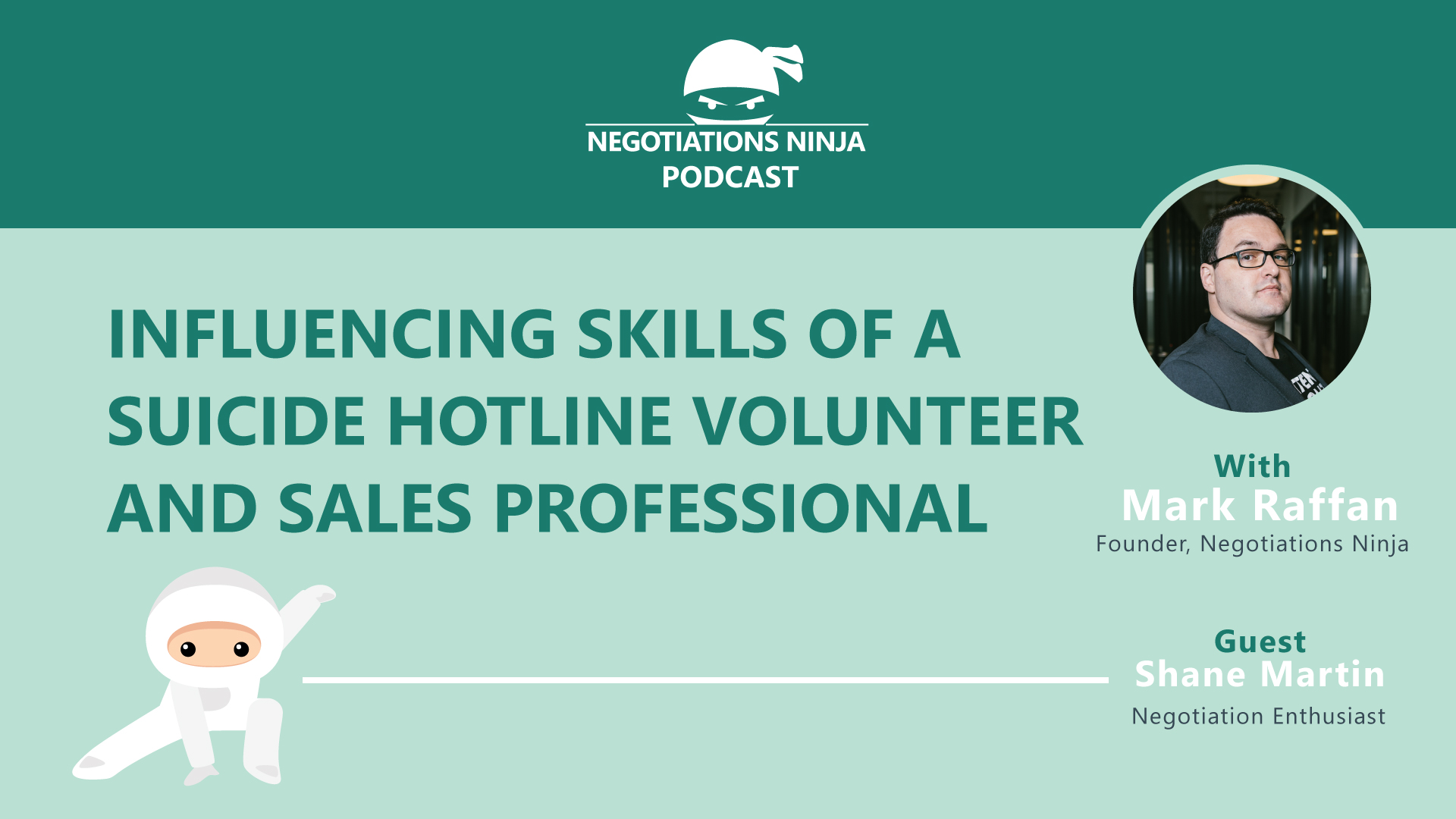Everyone involved in sales, procurement, or negotiations of any type needs to develop the influencing skills that make them effective. We are all influencers in one way or another (for bad or good) and intentional focus on making those innate skills work for us can have great results.
Shane Martin reached out to me because he has found that the same influencing skills he uses in his sales career are also powerfully effective in his role as a volunteer at his local suicide hotline. Join us for this conversation. We dive into influence, persuasion, and spend a good deal of time walking through Robert Cialdini’s work on influence as well.
Outline of This Episode
- [0:35] Meet our guest and a fan of the show, Shane Ray Martin
- [1:25] Why it’s important not only to listen but to apply what you learn from episodes
- [3:02] Shane’s motivation for volunteering at a suicide hotline
- [5:48] The right questions to get to the real issues behind the conversation
- [8:25] Teaching causes people to drop their guard
- [12:16] The six steps used by Shane’s volunteering with the suicide hotline
- [17:55] The pitfalls Shane sees salespeople make in negotiations
- [24:38] Cialdini’s 6 principles of influence
- [27:30] The power of social proof in negotiations and influence
Why the suicide hotline is a great place to develop negotiations skills for sales
When Shane began volunteering for the suicide hotline he did so because he wanted to make a difference in the lives of hurting people. But as an experienced and skilled sales professional he immediately noticed something amazing: the negotiation and influencing skills he used in his sales career were immediately useful in his work as a crisis counselor. In fact, the 6 steps every crisis counselor moves through when speaking to a caller are effective negotiation and influence tactics in their own right. You’ll enjoy hearing about the parallels between what Shane does as a crisis counselor and the situations he faces as a salesperson.
The right questions give words to the emotions present in every scenario
As you can imagine, working as a counselor on a suicide prevention team can be quite taxing on an emotional level. The people calling are typically quite emotional, often depressed, and on the verge of doing something dramatic. Their emotional state is more obvious and intense than what we encounter at the negotiations table, but the fact remains that emotion is a part of every negotiation, whether it’s with a person wanting to end their life or a person wanting to find a solution for their business problem.
Shane points out that learning to ask the right questions can open the door to the emotion under the surface that motivates much of what is said and done in negotiations. His insights are practical and quite insightful, so make sure you take the time to listen, learn, and apply what you hear.
Why teaching helps people drop their guard
Shane makes the observation that when you give to others, they naturally respond in an effort to give back to you. It’s one of the principles behind the truths behind Content Marketing and Sales Enablement approaches and can also have a significant impact on negotiations.
Shane says that teaching is also a form of giving. Providing helpful resources, tutoring, coaching, or step by step instructions that directly address a person’s (or company’s) needs enables them to more rapidly trust the one providing the information. I loved hearing Shane describe this principle because it’s something I’ve been teaching about in my negotiation training for a very long time.
Give value first, but not without knowing what you need in return
Since giving is such a powerful tool in the arsenal of those who are seeking to exert influence, it sounds like a very natural and simple thing to do. But Shane says that everything given in a negotiation context should be returned in some way and it’s in your best interest as a giving negotiator to know what you desire to receive in return before you step up to the negotiations table. Shane highlights why this is so important and ties it to Robert Cialdini’s 6 principles of influence, so be sure you listen.
Resources & People Mentioned
- www.ScoutRFP.com/negotiation (sponsor)
- Scott Tillema episode of Negotiations Ninja
- BOOK: Give and Take by Adam Grant
- BOOK: The Go Giver by Bob Burg
- Robert Cidaldini’s book “Influence”
- BOOK: Pre-suasion by Robert Chialdini
- Chialdini’s 6 Principles of Influence video
Connect with Shane Martin
- Shanes website: https://www.shaneraymartin.com/
- Follow Shane on LinkedIn
Connect With Mark
- Follow Negotiations Ninja on Twitter: @NegotiationPod
- Connect with Mark on LinkedIn
- Follow Negotiations Ninja on LinkedIn
- Connect on Instagram: @NegotiationPod




